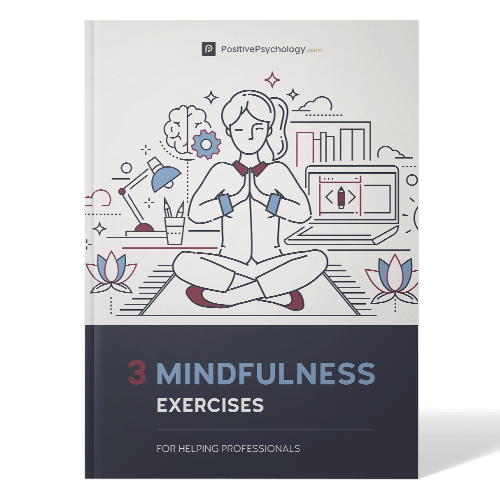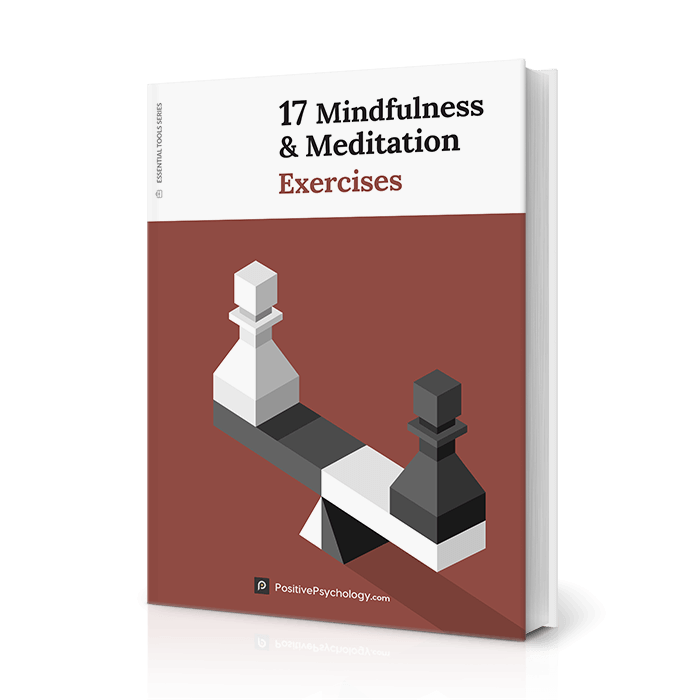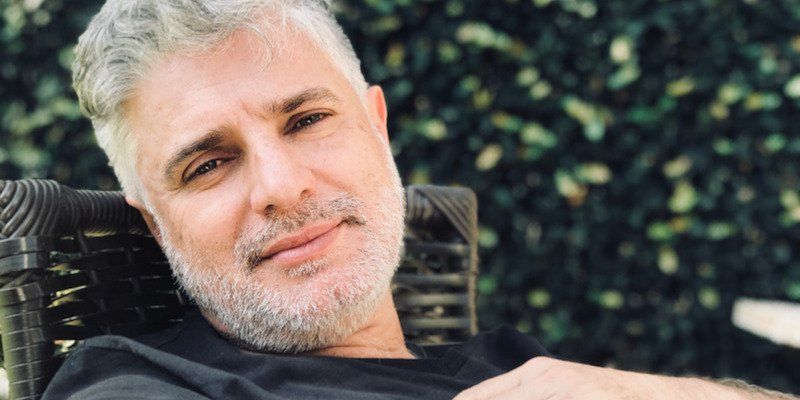What Is Meditation Therapy and What Are the Benefits?
 Is meditation therapy right for everyone? A quick look at the app Insight Timer tells you thousands of people are doing it worldwide. But are you? Should you?
Is meditation therapy right for everyone? A quick look at the app Insight Timer tells you thousands of people are doing it worldwide. But are you? Should you?
It has become the chic thing to do for some. You can find classes in yoga studios, cafes, and parks. You can even find one at your local library. For others, it is a path to healing. Perhaps their doctor or therapist suggested it.
In this article, we provide some of the research supporting this age-old practice.
Before you continue, we thought you might like to download our three Mindfulness Exercises for free. These science-based, comprehensive exercises will not only help you cultivate a sense of inner peace throughout your daily life, but will also give you the tools to enhance the mindfulness of your clients, students, or employees.
This Article Contains:
- What is Meditation Therapy? A Definition
- Research and Studies
- 6 Proven Benefits
- 8 Techniques Used in Meditation Therapy
- A Look at Stillness Meditation Therapy
- Using Somatic Meditation in a Therapeutic Setting
- How to Use Guided Meditations in Therapy
- Using Meditation Therapy for Depression
- How Can Meditation Therapy be Used for PTSD and Anxiety Disorders?
- Meditation Therapy Training and Certification
- A Take-Home Message
- References
What is Meditation Therapy? A Definition
Meditation therapy is “a method of relaxation and consciousness expansion by focusing on a mantra or a keyword, sound, or image while eliminating outside stimuli from one’s awareness” (Mosby’s Medical Dictionary, 2009).
There are many types of meditation. Examples include mindfulness, body scan, loving-kindness, walking, Zen, mantra, and transcendental meditations. They can be further categorized into insight or calming and guided or unguided. In the world of meditation, there is an approach for everyone.
Each type of meditation has a few things in common: choosing a quiet spot, finding a comfortable posture, and focusing your attention while remaining open (National Center for Complementary and Integrative Health, n.d.).
The duration of a meditation practice is as short as one minute to several hours. There also is not a “right” or “only” way to practice. It is as diverse as the people who practice it.
Research and Studies
Several studies are touting the benefits of meditation (NCCIH, n.d.). The degree to which a practice helps with various ailments has come into question. The primary issues have been small sample sizes and weak experimental design.
Goyal and colleagues (2014) conducted a review of 47 trials in 3,515 participants. The researchers found:
- Mindfulness meditation programs improve anxiety, depression, and pain at eight weeks and 3-6 months. They cite “moderate evidence” for these improvements.
- Low evidence for improved stress/distress and mental health-related quality of life.
- Low-to-no evidence of any effect on positive mood, attention, substance use, eating habits, sleep, or weight.
- No evidence that meditation programs were better than any active treatment (drugs, exercise, behavioral therapies.)
The authors point out that the studies up to June 2013 did not typically specify the level of expertise of the instructors, the amount of training patients received, or the amount of at-home practice patients did (Goyal et al., 2014).
Studies since their review have found connections between:
- Relaxation response training and reduced blood pressure (Bhasin et al., 2018). Note: This study did not include a control group of non-meditators.
- Mindfulness training and reduced cravings to smoke (Elwafi, Witkiewitz, Mallik, Thornhill, & Brewer, 2013).
- MBSR and CBT training and reduced chronic low back pain. Both were equally effective and resulted in “greater improvement in back pain and functional limitations at 26 weeks” when compared to the person’s regular care routine (Cherkin et al., 2016).
- Compassionate responses to another person’s suffering increases among meditation practitioners who have practiced for eight weeks (Condon, Desbordes, Miller, & DeSteno, 2013).
- Mindfulness meditation and alleviation of insomnia when compared to an eight-week self-monitoring condition (Ong et al., 2014).
6 Proven Benefits
To say something is “proven” in scientific terms is almost impossible. Social science researchers hesitate to say “x causes y.” They speak in terms of confidence intervals (CIs). The Association for Psychological Science has a fabulous article explaining this topic (Kalinowski, 2010).
Researchers use the term correlation when describing their results. This means that they have found a connection or no connection between the variables in question. For example, one might find that an 8-week mindfulness meditation training negatively correlated with a decrease in insomnia. As the person continued to use mindfulness meditation, their experience of insomnia lessened.
Does this mean that there are no “proven” effects of using meditation therapy? As the prior section indicated, the research is promising.
Here are six more studies:
- The amygdala changes after two months of meditation training. Desbordes and colleagues (2012) found that there is less activation in this area after learning meditation.
- Meditation has a stronger effect than relaxation training to reduce smoking and cravings (Tang, Tang, & Posner, 2013).
- Ramsburg and Youmans (2014) found that meditation improves the retention of information. In their experiments, college students received brief meditation training or rest. Then they listened to a lecture followed by a quiz. Students who received meditation training retained more information. Unaffected variables included mood, relaxation, and class interest.
- A 2015 study by Ching, Koo, Tsai, and Chen found that a semester-long mindfulness course improved learning effectiveness. It also enhanced participants’ attention and memory.
- Loving-kindness meditation reduces implicit bias against blacks and homeless people (Kang, Gray, & Dovidio, 2013). The researchers compared this result against a loving-kindness discussion group and a waitlisted group.
- Goldin, Ziv, Jazaieri, Hahn, and Gross (2013) compared MBSR to an aerobic exercise stress reduction program. They found that “meditation practice was associated with decreases in negative emotion and social anxiety symptom severity and increases in attention-related parietal cortex neural responses when implementing attention regulation of negative self-beliefs.”
8 Techniques Used in Meditation Therapy
A mental health professional may use a variety of techniques based on the patient’s needs. One exercise might work for one person but be ineffective for another. Fortunately, there are several options.
The University of Minnesota (n.d.) recommends these:
- Diaphragmatic (belly) breathing. Sit or lie comfortably on your back. Breathe in through your nose with your mouth closed. Exhale slowly through your mouth with your lips pursed. Try to make your exhalation longer than your inhalation.
- Straw breathing is a great way to extend your exhalation. Breathe in through your nose. Using a plastic straw, exhale through it until all the air leaves your lungs. Repeat this for anywhere from 2-5 minutes.
- 2-minute relaxation. Start by taking a few deep breaths. Remember to exhale slowly and fully. Be mindful of the air as it leaves your lungs. Scan your body for tense areas. Imagine warm light loosening the muscle. Allow your head to fall forward gently. Rotate to the left and right. Raise your head. Rotate left and right. Look up and then slowly return your head to a neutral position. If at any point you feel pain, stop. Roll your shoulders forward and back. Recall something pleasant. Take a few more deep breaths exhaling slowly.
- Exercise your shoulder and neck muscles to reduce tension. Stand or sit. Shrug your shoulders to your ears for a count of ten then release. Repeat as needed. Stretch your arms up and overhead without locking your elbows. Swing your arms at your sides forward and back, and side to side.
- Engage the relaxation response. Choose a quiet spot with little-to-no distractions. Get into a comfortable position. Choose a focal point such as your breath, a word, sound, or prayer. If you get distracted, imagine the distraction as a cloud sweeping across the sky. Let it float past without judgment or emotion. Return your attention to your focal point.
- Georgia Tech (n.d.) advises students to use the above techniques and Progressive Muscle Relaxation (PMR). Sit or lie in a comfortable position. Take a few deep breaths and close your eyes. Beginning at the top of your body, slowly tense and then release the muscles in your body. For a more detailed explanation, visit Georgia Tech Division of Student Life.
- Body scanning is useful for reducing pain. To start, lie on your back in a comfortable position, close your eyes, and breathe deeply. Focus on your left foot. Allow yourself to feel all the sensations. Do this for each part of your body. If you experience pain in any area as you move through your body, acknowledge it, breathe through the pain. Refrain from judging yourself or the pain (Harvard Health Publishing, 2016).
- Guided Imagery is using words and music to evoke imaginary scenarios in the listener. The goal is to assist the person to “see” and “feel” the imagined experience.
If you would like to experience a guided imagery meditation, listen to Jason Stephensen’s, Guided meditation for anxiety and stress.
A Look at Stillness Meditation Therapy
Developed by psychiatrist Dr. Ainslie Meares, this form of meditation involves “the natural regulation of the nervous system through the repeated experience of mental rest” (Stillness Meditation, n.d.) Unlike many other forms of meditation, stillness meditation is nonsectarian. It helps practitioners relieve stress and anxiety without drugs.
Stillness meditation is about allowing the mind to come to rest on its own. There are no specific breathing techniques. One does not need to listen to music, chant, visualize, or focus on emptying one’s mind. You are free to allow your mind to wander. It involves no effort. You are not trying to achieve anything.
Facilitated sessions might involve therapeutic touch. This helps the teacher communicate safety to the client allowing the client to experience successful mental rest (Stillness Meditation, n.d.).
Using Somatic Meditation in a Therapeutic Setting
Somatic meditation is body-centered. The goal is to identify and release negative tension throughout the body. To do this, a practitioner incorporates talk therapy, mind-body exercises, and physical techniques (Psychology Today, n.d.).
Practitioners believe that negative emotional experiences manifest through the body. This is not limited to physical pain. It also includes anger, frustration, and other emotions. During a therapy session, a client relives those negative emotions by recalling memories.
The therapist assists the person by integrating some of the following:
- Yoga
- Dance
- Vocal work
- Massage
- Exercise
- Deep breathing
- Relaxation exercises
- Meditation
Suggested Reading on the Topic
If you are interested in reading more on the topic, I have some suggestions below.
I recommend the following by Buddhist teacher and scholar, Reginald Ray:
- The Awakening Body: Somatic Meditation for Discovering Our Deepest Life (Amazon)
- The Practice of Pure Awareness: Somatic meditation for awakening the sacred (Amazon)
Manuela Mischke-Reeds, MA, MFT, is an international teacher of mindfulness-based somatic psychology and has an interesting workbook you can find below.
- Somatic psychotherapy toolbox: 125 Worksheets and exercises to treat trauma and stress (Amazon)
How to Use Guided Meditations in Therapy
As a therapist, having one’s own practice is helpful. Doing so allows you to understand better the challenges and rewards a meditation practice offers. This will increase your compassion toward your client. It also allows you to share your experiences, as appropriate. For example, how you acknowledge distractions without judgment.
Tara Brach (n.d.) suggests having clients work with a meditation teacher. Then, when the client returns to a session, the discussion can include how to incorporate their meditation into their therapy.
Body scan mindfulness meditation – Lewis Psychology
Using Meditation Therapy for Depression
One evidence-based approach is mindfulness-based cognitive therapy (MBCT). Borrowing from the MBSR format, Segal, Williams, and Teasdale developed MBCT to combat depression (Lu, 2015).
Like MBSR, MBCT is an 8-week program that includes yoga, body awareness, and daily homework. According to the Center for Mindfulness in Medicine, Health Care, and Society (n.d.), “the key difference in MBCT is an explicit focus on turning toward low mood and negative thoughts.”
Research (Lu, 2015) has shown that,
- People with early-onset depression, or who experienced abuse as a child are more likely to benefit.
- People who are “ready to engage” also benefit. These are people who’ve tried medication and or other therapies but still struggle.
- Recurring depressive episodes decrease with the use of MBCT. When compared to medication, the results were similar and better than a placebo.
Dimidjian and colleagues (2015) adapted MBCT for perinatal women. They found an “18% relapse/recurrence rate through 6 months postpartum.” For pregnant women battling depression, this research provides hope.
A 2014 study by Raes, Griffith, van der Gucht, and Williams found MBCT is well-suited for adolescents. Their randomized, controlled study was a first of its kind and included 408 students ages 13-20. Results showed that the intervention group experienced “significantly greater reductions in depression compared with the control groups at 6-month follow-up.”
How Can Meditation Therapy be Used for PTSD and Anxiety Disorders?
In 2015 the US Department of Veterans Affairs issued the Evidence Map of Mindfulness report. It summarized the research through February 2014 (Hempel et al., 2014). At that time, the report indicated some support for MBCT and MBSR interventions in the following areas:
- depression
- overall health and psychological outcomes
- chronic illness
- mental illness
- somatization disorders
Researcher Anthony King and colleagues (2013; 2016) studies mindfulness as a treatment for PTSD and anxiety. Through his various research projects, he found that:
- MBCT has the potential to “reduce avoidance symptom cluster and PTSD cognitions.”
- People receiving the intervention experience less self-blame.
- They have a decreased perception that the world is a dangerous place.
- Default Mode Network (DMN) activity increased along with activity in the executive system after mindfulness-based exposure therapy (MBET).
Neuroscientist, Jud Brewer has spent more than twenty years studying how the brain forms negative behavior patterns (Brewer, 2019). In doing this, he and his colleagues have developed tools that assist clients in breaking away from addiction and anxiety.
After learning about feedback loops like cue > routine > reward, the key ingredient is mindfulness training. In the case of anxiety, he explains, we have a thought/emotion that leads to worry thinking that then leads to avoidance/over-planning. This is the anxiety habit loop.
Through the intentional shifting of our attention, we can change this loop.
Meditation Therapy Training and Certification
Are you interested in teaching others how to manage the ups and downs of daily life through meditation therapy? There are many certification programs available worldwide.
Here are three you can explore:
1. Center for Mindfulness – UMass Medical School
MBSR teacher education and certification. This program offers a 5-course pathway to becoming a certified MBSR teacher. The process usually takes 36 months. The 8-week Fundamentals course is available in person and online. Costs are around $9,165 US.
2. UCSD Center for Mindfulness
Certifications include MBSR, MBCT, MSC (Mindfulness self-compassion) and ME-CL (Mindful Eating-Conscious Living). The process for each program is lengthy, and estimated costs are $9,510 US for MBCT to $12,520 US for MBSR certification. The other two programs are less than the MBCT cost.
3. Mindfulness Meditation Teacher Certification – Jack Kornfield and Tara Brach
This two-year program focuses on mindfulness, loving-kindness, and compassion meditation. It is completed online but does include two in-person events. They also include two three-day workshops for those who can attend. You must complete The Power of Awareness before applying for this program. Costs: $6,700 US.
There are many others. Please add suggestions in the comments for programs about which you are familiar with.
A Take-Home Message
Meditation, be it mindfulness or more traditional, is a healthy habit. Young and old can benefit from meditation therapy. If you want to feel less anxious, more grounded, and happier, then a meditation practice is an effective approach.
You do not need to spend hundreds of dollars learning to meditate. There are apps, YouTube videos, CDs, and books at low-to-no cost that will get you started on your journey.
If you want to use meditation to relieve PTSD or anxiety symptoms, then seek professional help from a trained therapist.
Meditation teachers are easy to find. Certification requirements vary, so be sure to choose your instructor with care.
How will you incorporate meditation into your life so that you can reap the benefits?
We hope you enjoyed reading this article. Don’t forget to download our three Mindfulness Exercises for free.
- Bhasin, M. K., Denninger, J. W., Huffman, J. C., Joseph, M. G., Niles, H., Chad-Friedman, E., … & Libermann, T. A. (2018). Specific transcriptome changes associated with blood pressure reduction in hypertensive patients after relaxation response training. The Journal of Alternative and Complementary Medicine, 24(5), 486-504.
- Brach, T. (2016, August 30). Guidelines: Introducing meditation practices to psychotherapy clients [Blog post]. Retrieved from https://www.tarabrach.com/introducing-meditation-practices/
- Brewer, J. (2019, March 9). Habit loops & everyday addictions [Blog post]. Retrieved from https://drjud.com/habit-loops-everyday-addictions/
- Center for Mindfulness in Medicine, Health Care, and Society. (n.d.). MBCT & MBSR: The differences [Blog post]. Retrieved from https://www.umassmed.edu/cfm/mindfulness-based-programs/mbct-courses/about-mbct/mbct-mbsr-differences/
- Cherkin, D. C., Sherman, K. J., Balderson, B. H., Cook, A. J., Anderson, M. L., Hawkes, R. J., … & Turner, J. A. (2016). Effect of mindfulness-based stress reduction vs cognitive behavioral therapy or usual care on back pain and functional limitations in adults with chronic low back pain: A randomized clinical trial. Jama, 315(12), 1240-1249.
- Ching, H., Koo, M., Tsai, T., & Chen, C. (2015). Effects of a mindfulness meditation course on learning and cognitive performance among university students in Taiwan. Evidenced-Based Complimentary and Alternative Medicine. Retrieved from https://www.hindawi.com/journals/ecam/2015/254358/
- Condon, P., Desbordes, G., Miller, W. B., & DeSteno, D. (2013). Meditation increases compassionate responses to suffering. Psychological Science, 24(10), 2125-2127.
- Desbordes, G., Negi, L. T., Pace, T. W., Wallace, B. A., Raison, C. L., & Schwartz, E. L. (2012). Effects of mindful-attention and compassion meditation training on amygdala response to emotional stimuli in an ordinary, non-meditative state. Frontiers in Human Neuroscience, 6.
- Dimidjian, S., Goodman, S. H., Felder, J. N., Gallop, R., Brown, A. P., & Beck, A. (2015). An open trial of mindfulness-based cognitive therapy for the prevention of perinatal depressive relapse/recurrence. Archives of Women’s Mental Health, 18(1), 85-94.
- Elwafi, H. M., Witkiewitz, K., Mallik, S., Thornhill IV, T. A., & Brewer, J. A. (2013). Mindfulness training for smoking cessation: Moderation of the relationship between craving and cigarette use. Drug and Alcohol Dependence, 130(1-3), 222-229.
- Georgia Tech Division of Student Life. (n.d.). Meditation and relaxation techniques [Blog post]. Retrieved from http://www.counseling.gatech.edu/content/meditation-and-relaxation-techniques
- Goldin, P., Ziv, M., Jazaieri, H., Hahn, K., & Gross, J. J. (2013). MBSR vs aerobic exercise in social anxiety: fMRI of emotion regulation of negative self-beliefs. Social Cognitive and Affective Neuroscience, 8(1), 65-72.
- Goyal, M., Singh, S., Sibinga, E. M., Gould, N. F., Rowland-Seymour, A., Sharma, R., … & Haythornthwaite, J. A. (2014). Meditation programs for psychological stress and well-being: A systematic review and meta-analysis. JAMA Internal Medicine, 174(3), 357-368.
- Harvard Health Publishing. (2016, December 24). Body scan mindfulness exercise for pain [Blog post]. Retrieved from https://www.health.harvard.edu/pain/body-scan-for-pain
- Hempel, S., Taylor, S. L., Marshall, N. J., Miake-Lye, I. M., Beroes, J. M., Shanman, R., …Shekelle, P. G. (2014) Evidence map of mindfulness. Retrieved from https://www.hsrd.research.va.gov/publications/management_briefs/default.cfm?ManagementBriefsMenu=eBrief-no88
- Kalinowski, P. (2010, April 1). Understanding confidence intervals (CIs) and effect size estimation. Retrieved from https://www.psychologicalscience.org/observer/understanding-confidence-intervals-cis-and-effect-size-estimation
- Kang, Y., Gray, J. R., & Dovidio, J. F. (2014). The nondiscriminating heart: lovingkindness meditation training decreases implicit intergroup bias. Journal of Experimental Psychology: General, 143(3), 1306-1313.
- King, A. P., Block, S. R., Sripada, R. K., Rauch, S., Giardino, N., Favorite, T., … & Liberzon, I. (2016). Altered default mode network (DMN) resting state functional connectivity following a mindfulness‐based exposure therapy for posttraumatic stress disorder (PTSD) in combat veterans of Afghanistan and Iraq. Depression and Anxiety, 33(4), 289-299.
- King, A. P., Erickson, T. M., Giardino, N. D., Favorite, T., Rauch, S. A., Robinson, E., … & Liberzon, I. (2013). A pilot study of group mindfulness‐based cognitive therapy (MBCT) for combat veterans with posttraumatic stress disorder (PTSD). Depression and Anxiety, 30(7), 638-645.
- Lu, S. (2015). Mindfulness holds promise for treating depression. Monitor on Psychology, 46(3), 50.
- Meditation therapy. (n.d.). In Mosby’s Medical Dictionary. Retrieved from https://medical-dictionary.thefreedictionary.com/meditation+therapy
- National Center for Complementary and Integrative Health. (n.d.). Meditation: In Depth. Retrieved from https://nccih.nih.gov/health/meditation/overview.htm
- Ong, J. C., Manber, R., Segal, Z., Xia, Y., Shapiro, S., & Wyatt, J. K. (2014). A randomized controlled trial of mindfulness meditation for chronic insomnia. Sleep, 37(9), 1553-1563.
- Psychology Today. (n.d.). Somatic therapy. Retrieved from https://www.psychologytoday.com/us/therapy-types/somatic-therapy
- Raes, F., Griffith, J. W., Van der Gucht, K., & Williams, J. M. G. (2014). School-based prevention and reduction of depression in adolescents: A cluster-randomized controlled trial of a mindfulness group program. Mindfulness, 5(5), 477-486.
- Ramsburg, J. T., & Youmans, R. J. (2014). Meditation in the higher-education classroom: Meditation training improves student knowledge retention during lectures. Mindfulness, 5(4), 431-441.
- Stillness Meditation. (n.d.). Retrieved from http://stillnessmeditation.com.au/
- Tang, Y. Y., Tang, R., & Posner, M. I. (2013). Brief meditation training induces smoking reduction. Proceedings of the National Academy of Sciences, 110(34), 13971-13975.
- University of Minnesota. (n.d.). Taking charge of your health and wellbeing [Blog post]. Retrieved from https://www.takingcharge.csh.umn.edu/activities/other-relaxation-methods.
Let us know your thoughts
Read other articles by their category
- Body & Brain (49)
- Coaching & Application (57)
- Compassion (26)
- Counseling (51)
- Emotional Intelligence (24)
- Gratitude (18)
- Grief & Bereavement (21)
- Happiness & SWB (40)
- Meaning & Values (26)
- Meditation (20)
- Mindfulness (45)
- Motivation & Goals (45)
- Optimism & Mindset (34)
- Positive CBT (29)
- Positive Communication (20)
- Positive Education (47)
- Positive Emotions (32)
- Positive Leadership (18)
- Positive Parenting (4)
- Positive Psychology (33)
- Positive Workplace (37)
- Productivity (17)
- Relationships (46)
- Resilience & Coping (36)
- Self Awareness (21)
- Self Esteem (38)
- Strengths & Virtues (32)
- Stress & Burnout Prevention (34)
- Theory & Books (46)
- Therapy Exercises (37)
- Types of Therapy (64)





What our readers think
If I want the definition of meditation do I cite your article or do I just reference the dictionary.
If I want to use the definition for meditation therapy , do I just refer to the mosbys medical dictionary ? Or do I have to cite this article in app format ?
Hi Kori
The article does not discuss the work of Dr Ainslie Meares who wrote 35 books about various aspects of his method. Meares taught meditation in Australia from the late 1950s till his passing in 1985 and there are still teacher teaching his method. Dr Meares was also an internationally recognised medical hypnotist.
His method consists of relaxing the body, relaxing the mind so that thoughts slow and the mind stills. when one has the basic skill then one practices Stillness Meditation in various circumstances to broaden out the stillness. One also learns to carry over the effects of meditation into daily living – Meares referred to this as the “on-flow” or flow on of meditation. His books are only available secondhand and some years ago I wrote a summary book, Ainslie Meares on Meditation, of his work which includes his Relief Without Drugs book, some samples of his meditation poetry (he wrote 11 poetry books) as well as the refinements from several of his other books. It also includes a biography of Dr Meares himself.
I trust this information is of interest.
Owen Bruhn